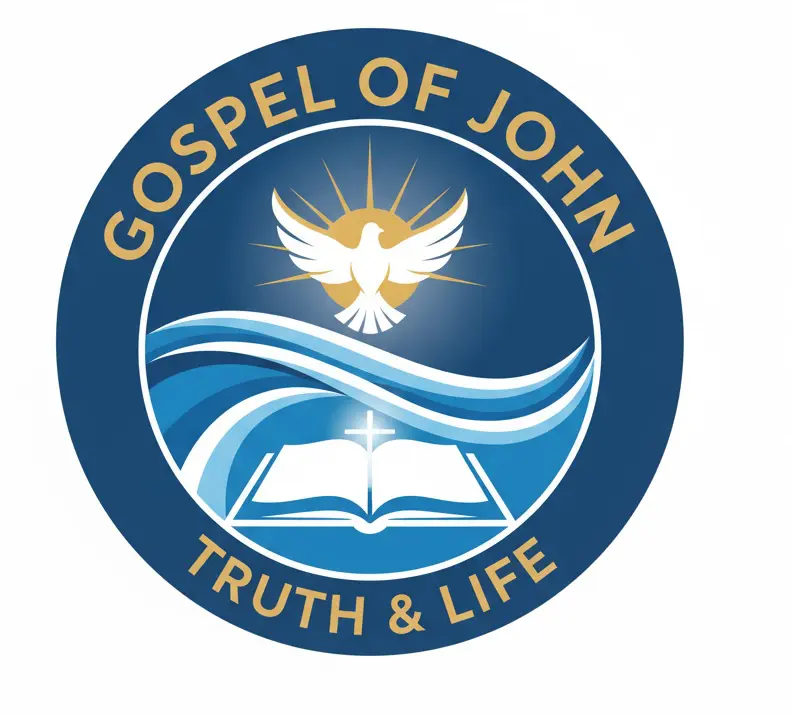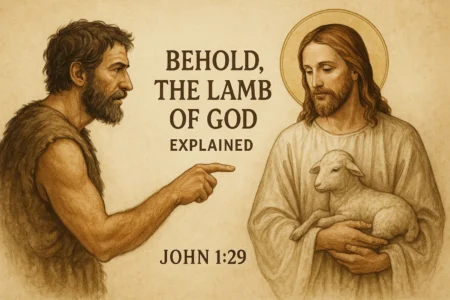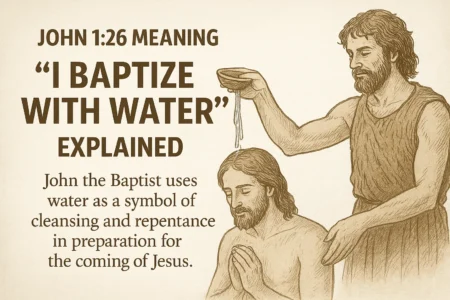Some Bible verses feel like a warm blanket. Others feel like a splinter in your brain.
For me, John 1:30 has always been the splinter.
I must have read it a dozen times before the words actually… landed. John the Baptist, the older cousin, the guy who was literally born first, points at Jesus and says, “This is the one I meant when I said, ‘A man who comes after me has surpassed me because he was before me.’”
Wait. What?
How can someone who comes after you have been before you? It sounds like a logic puzzle, not a sermon. And in many ways, that’s the genius of it. This isn’t just a clever play on words. It’s one of the biggest statements in the entire New Testament about who Jesus is. It’s the master key that unlocks the whole Gospel of John: that the man from Nazareth was, and is, so much more than just a man.
So, getting John 1:30 explained isn’t just about solving a riddle. It’s about seeing Jesus clearly, right from the very first witness. Let’s pull this verse apart and see what makes it tick.
More in John Chapter 1 Category
Key Takeaways
Before we get into the weeds, here’s the short version of what John the Baptist was really saying:
- It’s a Riddle on Purpose: John 1:30 is meant to sound impossible. Jesus came after John (in birth and ministry), but was before him.
- The ‘Before’ Has Two Meanings: Here’s the trick. “Before” means (1) Supreme Rank (Jesus is infinitely more important) and (2) Eternal Pre-existence (Jesus is the divine Son of God who existed before creation).
- He’s Calling Jesus God: This is John’s way of saying, “This isn’t just another prophet. This is God.”
- It’s John’s Entire Job: This statement perfectly sums up John’s job: get out of the way and point to the One who was always there.
Who Was John the Baptist, Really?
We can’t get what John said until we get who John was.
And this wasn’t just some random guy with a sign on a street corner. This was John the Baptist. He was a somebody. Prophets like Isaiah and Malachi had written about this guy centuries earlier. He was the forerunner, the divinely appointed messenger sent to “prepare the way of the Lord.”
His own birth was a miracle. His parents, Zechariah and Elizabeth, were way past their child-bearing years. The angel Gabriel—the same one who would later visit Mary—announced his birth and his whole life’s mission. He was, in fact, Jesus’s cousin, and about six months older.
So, on every human level—age, fame, the start of his public ministry—John came first.
He was the last and greatest of the Old Testament prophets, a bridge standing between the old covenant and the new. People were pouring out of Jerusalem and all Judea to see him. He was a sensation.
What Was John’s Big Message?
John’s message wasn’t complicated, but it was fiery. “Repent, for the kingdom of heaven is at hand!” (Matthew 3:2). He called people to own their sin and be baptized in the Jordan River as an outward sign of that inward change.
But the most crucial part of his message wasn’t about himself. At all. He was constantly pushing the spotlight away. When the religious leaders grilled him, “Who are you? Are you the Christ?” John’s answer was a sharp, “I am not.” (John 1:20).
He defined himself only by who he was waiting for. “I baptize with water,” he said, “but among you stands one you do not know, the one who comes after me, the strap of whose sandal I am not worthy to untie” (John 1:26-27). This context is everything. John was already telling the world he was a nobody compared to this other person. It sets the stage perfectly for John 1:30.
So, What Does John 1:30 Actually Say?
Let’s look at the verse again, this time with its surrounding context. After Jesus has been baptized, John sees Jesus and makes one of the most famous declarations in history: “Behold, the Lamb of God, who takes away the sin of the world!” (John 1:29).
Then, he points right at him and says to his own disciples:
“This is the one I meant when I said, ‘A man who comes after me has surpassed me because he was before me.’” (John 1:30)
He lays the puzzle right out on the table.
- A man comes after me (chronologically).
- He has surpassed me (in importance).
- Because… he was before me (the reason for his greatness).
He’s tying Jesus’s importance directly to where (and when) he came from. That last part, “because he was before me,” is the reason for the first part, “he has surpassed me.” This isn’t just a word puzzle. It’s an argument.
Why Does This Sound Like a Riddle?
This kind of talk is designed to stop you in your tracks. It’s meant to make the listener—both then and now—pause and ask, “What on earth is he talking about?”
It reminds me of my first college philosophy class. The professor wrote a classic paradox on the board: “Can an omnipotent being create a stone so heavy he cannot lift it?” My brain just about short-circuited. I couldn’t resolve the two conflicting ideas. It felt like a trap. But the whole point wasn’t a “yes” or “no” answer; it was to force us to redefine our assumptions about “omnipotence.”
John 1:30 works the same way. It’s a spiritual “brain-teaser.” It forces us to shatter our human assumptions about Jesus. We can’t understand this verse if we think of Jesus as just a man. The paradox is the hook. It’s how John gets you to listen to the real truth.
Could Jesus Have Existed Before His Birth in Bethlehem?
Yes. Full stop.
This is the heart of the John 1:30 explained puzzle, and it’s the central claim of Christianity. The answer to the riddle is what theologians call “Christ’s pre-existence.”
When John says Jesus “was before me,” he doesn’t mean his human life. He’s not saying Jesus had a previous life or was reincarnated. He is making a radical claim about Jesus’s divine nature. He is saying that Jesus, the man he’s pointing at, is the eternal Son of God, the “Word” who existed with God the Father before the world even began.
The human being, Jesus of Nazareth, was born in Bethlehem, after John.
But the divine person, the Son of God, existed from all eternity, before John, before Abraham, before time itself.
What Does It Mean for Jesus to ‘Pre-exist’?
“Pre-existence” is the theological term for this belief: that Jesus, as the second person of the Trinity, existed eternally with God the Father before His incarnation—that is, before He “became flesh” (John 1:14) and was born as a human baby to Mary.
Think about it this way: My life began on the day I was born. My existence is finite. I have a clear starting point. John the Baptist had a clear starting point. You have a clear starting point.
John the Baptist, through divine revelation, looks at Jesus and says, “That man… He doesn’t have a starting point. He is the starting point.”
This is why John 1:30 is so important. It’s not a later idea developed by the church. It is the very first public testimony about Jesus from the very first witness. John the Baptist, the forerunner, immediately points to Jesus’s two biggest claims to fame, right out of the gate: He is the “Lamb of God” (His mission) and He is the eternal “One who was before me” (His identity).
Where Else Does the Bible Talk About This?
This idea of pre-existence isn’t just a one-off, strange comment from John the Baptist. It is the main theme of the entire Gospel of John and a huge teaching throughout the New Testament. John 1:30 is like the opening bell for a theme you’ll hear over and over.
Here are just a few other places this truth is echoed:
- John 1:1-3: “In the beginning was the Word, and the Word was with God, and the Word was God. He was in the beginning with God. All things were made through him, and without him was not any thing made that was made.” This is the grand, cosmic explanation of what John 1:30 implies.
- John 8:58: This is perhaps the most shocking parallel. Jesus himself confronts the religious leaders. They mock him, saying he’s not even fifty years old, yet he claims to have “seen Abraham.” Jesus replies with one of the most powerful “I AM” statements: “Truly, truly, I say to you, before Abraham was, I am.” He doesn’t say, “Before Abraham was, I was.” He uses the divine name, “I AM,” aligning himself with the eternal, self-existent God who spoke to Moses from the burning bush.
- Colossians 1:16-17: The Apostle Paul, writing separately, confirms the same doctrine. Speaking of Jesus, he says, “For by him all things were created, in heaven and on earth, visible and invisible… All things were created through him and for him. And he is before all things, and in him all things hold together.”
- Philippians 2:5-7: Paul again speaks of Christ’s pre-existence, explaining, “who, though he was in the form of God, did not count equality with God a thing to be grasped, but emptied himself, by taking the form of a servant, being born in the likeness of men.” You cannot “empty yourself” of the form of God unless you first existed in the form of God.
John 1:30 lines up perfectly with the rest of the New Testament. John the Baptist said it first, and the apostles spent the rest of their lives trying to explain just how big that truth really was.
Is ‘Before’ Just About Time, or Something More?
This is where the verse gets even richer. The Greek word for “before” (protos) can, and often does, mean “first in time.” But it can also mean “first in rank,” “chief,” or “most important.”
So why choose just one meaning when both are true?
John the Baptist is a master of the “theological double-entendre.” He is almost certainly using the word to mean both things at once.
Jesus “was before me” in time (He is eternal). And He “was before me” in rank (He is supreme Lord).
Think about it. His eternal nature is why he has that supreme rank. He’s more important because he’s eternal God. The two meanings don’t fight each other; they lock together.
How Did Ancient Cultures Think About ‘First’ and ‘Last’?
In our modern, Western world, we are obsessed with “first.” First place, first in line, first to invent. We are very linear.
But in many ancient cultures, “first” was a statement of status and honor, not just chronology. The “first-born” son (the prototokos) received the inheritance and the authority, even if he was only born moments before his twin. The “first” man of the city was the mayor or governor.
When John says Jesus “has surpassed me,” he’s already talking about rank. He’s saying this man who walked up to him at the Jordan River is the chief, the Lord, the one in charge. And that’s why he’s protos—he’s “first” in every way you can imagine, in time and in rank.
How Does John the Baptist Himself Show This?
John’s own actions prove he understood “before” as a matter of rank. He famously says he is not even worthy to untie Jesus’s sandals.
We have to understand what that meant. In that culture, untying someone’s sandals was a filthy, menial task reserved for the lowest of slaves. A disciple was expected to do many things for his rabbi, but even a disciple was not required to untie his rabbi’s sandals. It was considered too demeaning.
John, this fiery prophet, this man who commanded the attention of crowds and kings, this man whom Jesus himself would later call the greatest of all men “born of women” (Matthew 11:11), takes one look at Jesus and says, “I am not even worthy to be his lowest slave.”
This is a wild statement of Jesus’s supreme rank. John understood. He knew who Jesus was.
It reminds me of a time a few years back when I had the chance to be in a small meeting with a man I deeply respect, a renowned scholar and author whose books had literally shaped my worldview. I’m generally a confident person, but I remember sitting there feeling completely tongue-tied. I was acutely aware that his wisdom, his experience, his “stature” in that field, was on a completely different plane than my own. I felt an overwhelming sense of humility and respect.
Now, multiply that feeling by infinity. That is what John the Baptist felt. He wasn’t just meeting a great scholar; he was meeting his eternal Creator. His statement in 1:30 wasn’t just a clever line; it was a gasp. It was worship.
So, What’s the Real Point of the Paradox?
Let’s put it all together. How was Jesus “before” John?
He was before John in Time (Eternal Pre-existence). He was before John in Rank (Supreme Divinity).
The paradox is the whole point. John 1:30 is a divinely inspired puzzle that must be solved by recognizing Jesus as God. Any other explanation (that John was confused, that Jesus was just a “greater” prophet) completely neuters the verse and ignores the testimony of John the Baptist himself.
John is saying: “This man who seems to be my junior, my follower, the one who is younger than me and starting his ministry after me… in reality, He is my eternal Creator and my supreme Lord.”
Why Did John the Baptist Grasp This So Clearly?
How did John know this? He didn’t just guess. He didn’t look at Jesus and think, “Wow, that guy seems impressive.”
John tells us himself, just a few verses later: “I myself did not know him, but he who sent me to baptize with water said to me, ‘He on whom you see the Spirit descend and remain, this is he who baptizes with the Holy Spirit.’ And I have seen and have borne witness that this is the Son of God.” (John 1:33-34).
God told him. He gave him a sign to look for—the Holy Spirit descending—and when he saw it, the truth clicked in his heart. So when John says this, it’s not his opinion. It’s an eyewitness report of what God showed him.
Okay, So Why Does This Ancient Riddle Matter to Me?
We’ve solved the puzzle. But why should this ancient paradox matter to us, right here, right now?
A clear John 1:30 explained isn’t just a fun piece of biblical trivia. It’s a huge part of Christian belief.
What’s the Big Lesson from John 1:30 for Jesus’ Identity?
This verse, right at the start of Jesus’s ministry, establishes His true identity beyond all doubt. The very first witness, the one chosen by God to prepare the way, testifies that Jesus is:
- The Lamb of God (v. 29) – His Mission (Atonement for sin)
- The Eternal One (v. 30) – His Identity (Eternal God)
- The Son of God (v. 34) – His Relationship (Oneness with the Father)
This verse demolishes any attempt to reduce Jesus to just a good man, a wise teacher, or a great prophet. A prophet speaks the word of God. John testifies that Jesus is the Word of God. That’s a difference as wide as eternity itself.
What’s the Big Lesson for Our Own Lives?
The verse also gives us a profound model of humility. Look at John the Baptist. He was the celebrity. He had the crowds. He was the one everyone was talking about. And the moment Jesus arrives, John’s entire mission becomes pointing away from himself and to Jesus.
His whole life was a living example of his other famous words: “He must increase, but I must decrease” (John 3:30).
John 1:30 is the perfect example of “decreasing.” It is John taking his own ministry, his own reputation, his own chronological “firstness,” and placing it all under the feet of Jesus, the one who was truly “first.” It challenges us to ask the same question: Is my life about pointing to myself, or am I, like John, a voice pointing to the supreme and eternal Christ?
How Does This Lock in the Gospel’s Message?
Finally, this verse shows the beautiful, rock-solid consistency of the Bible. The Gospel of John is famous for its “high Christology”—its deep teaching on Christ’s divinity. And it all begins here, with the very first witness.
John the Apostle (who wrote the Gospel) isn’t inventing this doctrine. He is recording that John the Baptist (the forerunner) proclaimed this doctrine from day one. The testimony is unified. The message is consistent.
The Gospel of John sets out to prove one thing: “that you may believe that Jesus is the Christ, the Son of God, and that by believing you may have life in his name” (John 20:31). And it begins its argument with the unshakable, eyewitness testimony of the forerunner himself, who, upon seeing the man from Nazareth, declared that He was, in fact, the eternal God who was “before” all things. For a deeper academic dive into the Christology of John’s Gospel, this Lumina commentary on John 1 from Bible.org is a great place to go.
It’s not a riddle to solve and forget. It’s a truth to sit with. The man who came after was before because He is the God who is. He is the Alpha and the Omega, the beginning and the end. He stepped into time, but He exists outside of time.
The forerunner, the older cousin, the first to preach, understood this. And in one mind-bending, paradoxical sentence, he told the world exactly who Jesus was.
FAQ – John 1:30 Explained
Why does John 1:30 describe Jesus in a paradoxical way, saying He comes after John but was before him?
This paradox emphasizes that Jesus’ importance surpasses human notions of time and rank, highlighting His divine pre-existence and supreme authority as the eternal God, which cannot be understood purely through chronological order.
How did John the Baptist recognize Jesus’ divine nature?
John recognized Jesus’ divine nature through divine revelation; God had told him that the Spirit descending and remaining on Jesus would be the sign identifying Him as the Son of God, which John personally witnessed.
What does ‘pre-existence’ mean regarding Jesus, as discussed in the Bible?**
Pre-existence means that Jesus, as the second person of the Trinity, existed eternally with God before His incarnation in human form, asserting His divine nature beyond His earthly life.
Why is Johnny 1:30 considered a core message for Christian faith?**
Because it establishes Jesus’ true identity as both the divine eternal Son of God and the Lamb who takes away sin, serving as a foundational statement that affirms Christ’s divinity and purpose from the very beginning of His public ministry.





